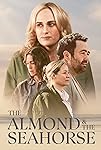Eye For Film >> Movies >> The Almond And The Seahorse (2022) Film Review
The Almond And The Seahorse
Reviewed by: Jennie Kermode

When one has a traumatic brain injury, life begins in the middle, so it seems fitting that Celyn Jones and Tom Stern’s film does the same. In the middle of an affair, to be precise, though it’s not clear that Sarah (Rebel Wilson) sees it that way. Suddenly shy, asking for a towel before she will leave the bedcovers, she’s wracked with guilt about her husband Joe. She’s used to nobody really understanding. When Toni (Charlotte Gainsbourg) interrupts her to detail her own experience, it throws her right off track.
For Gwen (Trine Dyrholm), Toni’s partner, every day begins with finding herself in a strange place, wondering what’s going on. She has to contend with the shock of Toni looking older, and then with discovering what has happened to her own body. Once she’s taken it all in, she copes fairly well, but her sharpness brings with it an additional dimension of horror: the awareness that she will experience the same trauma over and over again.

For Joe (Celyn Jones), the effects of injury are different. He too has retrograde amnesia, relying on a book he wrote for himself to navigate each day as independently as possible whilst Sarah, an archaeologist, is at work – but for him, the additional loss of short term memory leads to ongoing confusion. He’s also disinhibited, so, without intending any harm, he behaves in ways that unsettle other people and sometimes attract hostility. When he gets overwhelmed he can become aggressive, like a toddler, but he’s a big guy, and that can be scary to be around.
“I miss the real Joe,” says Sarah one day, breaking down, exhausted by it all. A little while later, having looked at his book and figured out the basics of what’s happening, Joe says “I want the real Sarah,” and she is forced to confront the fact that what has happened has changed her, too, into somebody else.
With its characters trapped in what feels like an eternal present, the film – which takes its name from the shape of the amygdala and hippocampus, seats of emotion and memory, and therefore of personal identity – moves back and forth across a period of years during which they have a good deal to figure out. One of the challenges of living with any serious disability or illness is navigating life without a roadmap. The usual rules and expectations don’t make sense. People need to find different ways to exist, to love and to grow, and they need to make that work within the confines of a society whose limitations then become acutely apparent.
Although its characters are all insulated somewhat by money and middle class privilege, there is no shortage of suffering here, real and easy to observe, not forced or indulged. There is also humour. The dream cast includes support from Alice Lowe, whose contribution is a treat as always. Jones also delivers a carefully judged performance which is human and tragic but makes room for an appreciation of the ridiculous. If you're paying attention, you will also note the ways that the script pokes fun at the assumptions people hold before finding themselves in situations like this – and sometimes after wards too: the belief that we are somehow static, logical, consistent creatures who can always expect to connect with one another in the same ways over time.
The happiness to be found here does not belong only to the non-disabled characters, and does not exist only in the disabled characters’ absence. All four main players have their own agency and their own arcs, with Gwen and Joe, despite the greater difficulties involved, gradually finding their own means of embracing what life has to offer to them. Sarah and Toni’s connection is by no means straightforward and the film doesn’t sugar coat it. They have very different journeys to go on. Ultimately there can be no peace, no relief, without accepting a measure of suffering and lack of control.
Moving a little too slowly in the first half – though that does help us to relate to the characters’ frustration – The Almond And The Seahorse gradually coalesces like the pieces of an old memory coming back together. It’s a warm-hearted tale which celebrates forgiveness and gratitude, and it will mean the world to viewers going through something similar, whilst helping to prepare those who are yet to face these aspects of life.
Reviewed on: 09 May 2024


















